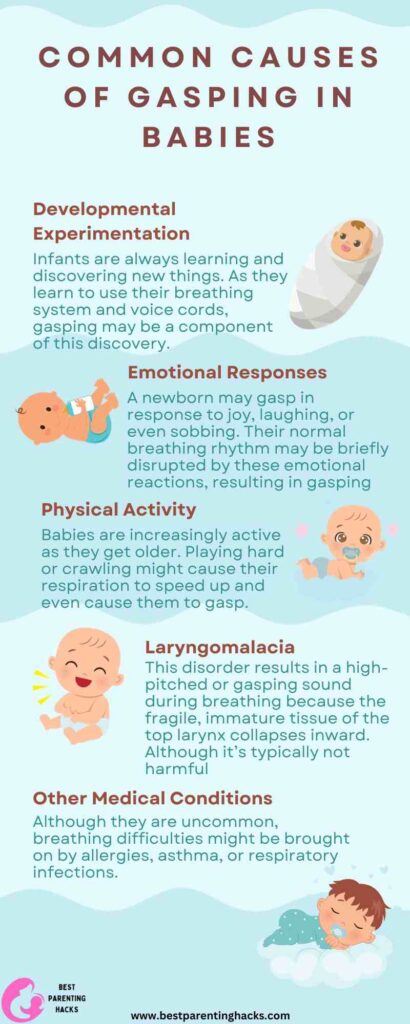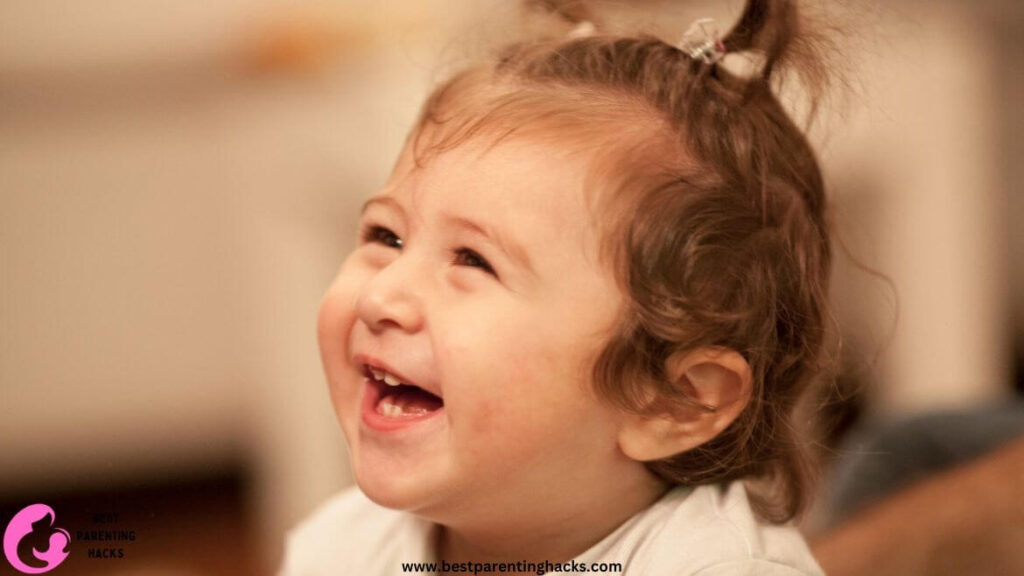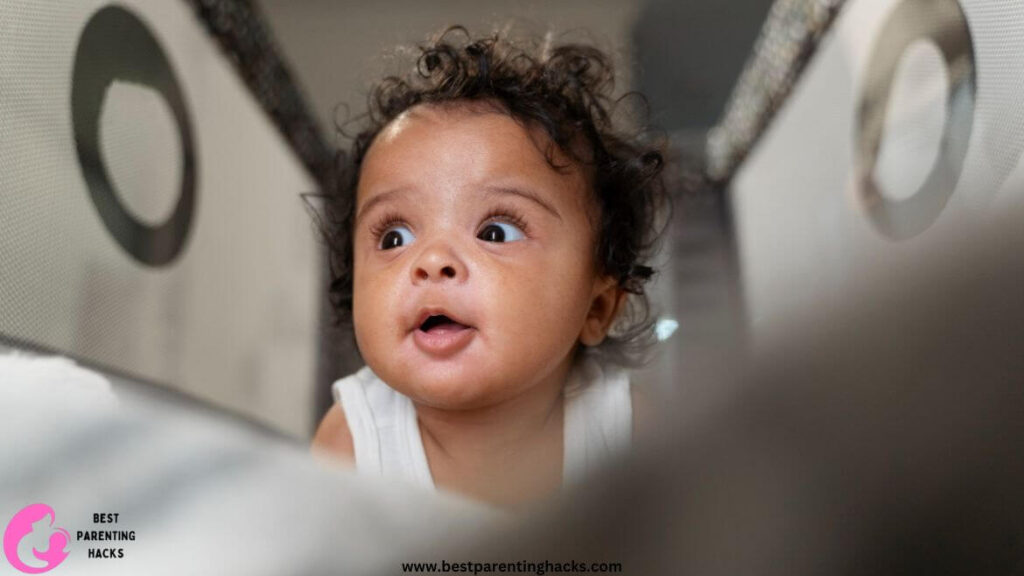Table of Contents
- Common Causes of Gasping in Babies
- Understanding Baby’s Breathing Patterns
- When to Worry: Recognizing Alarming Signs
- Laryngomalacia: A Common Cause of Noisy Breathing
- Parental Observations and Experiences
- Medical Perspective and Diagnosis
- Managing and Treating the Condition
- Preventive Measures and Best Practices
- FAQs
Being a parent is an amazing adventure that is full of happy, anxious, and lifelong learning moments. Recognizing and adapting to their infant’s diverse behavioral and bodily reactions is one thing that frequently requires parents to be on their toes. A newborn gasping for air is one of the most concerning of them, especially if they are thrilled. It’s a noise that draws your attention right away and might cause a chain reaction of concerns. However, as I’ve discovered from my personal experiences and in-depth study, this phenomenon—while first concerning—is frequently a typical aspect of newborn development.
Babies are continually learning to manage their bodies and adjust to their surroundings throughout the first few months of life. Their developing respiratory system is one example of this. Babies’ breathing patterns may alter quickly when they become aroused, whether it’s from playing, seeing someone they recognize, or experiencing a favorite sound. Gasping may occasionally be the result of this shift. Although you should always be on the lookout for your baby’s health, you should also know that gasping from time to time is usually normal and shouldn’t be taken too seriously, especially if the infant is enthusiastic or engaged. To be sure that what you’re seeing is safe, it’s important to comprehend the subtleties of this behavior.

Common Causes of Gasping in Babies
1. Developmental Experimentation: Infants are always learning and discovering new things. As they learn to use their breathing system and voice cords, gasping may be a component of this discovery. Usually intermittent, this kind of gasping is not a reason for alarm.
2. Emotional Responses: A newborn may gasp in response to joy, laughing, or even sobbing. Their normal breathing rhythm may be briefly disrupted by these emotional reactions, resulting in gasping.
3. Physical Activity: Babies are increasingly active as they get older. Playing hard or crawling might cause their respiration to speed up and even cause them to gasp.
4. Laryngomalacia: This disorder results in a high-pitched or gasping sound during breathing because the fragile, immature tissue of the top larynx collapses inward. Although it’s typically not harmful, it’s the most prevalent cause of persistent stridor in newborns, which is loud breathing.
5. Other Medical Conditions: Although they are uncommon, breathing difficulties might be brought on by allergies, asthma, or respiratory infections. These are significant options to take into account, particularly if the gasping occurs frequently or is accompanied by additional signs such as blue lips, wheezing, or coughing.
You Might Also Like to Read: Baby Makes Humming Noise When Sleeping
Understanding Baby’s Breathing Patterns
1. Normal Infant Breathing: It’s important to have a basic knowledge of what constitutes normal newborn breathing. Generally speaking, a baby’s breathing might be erratic; they could breathe quickly for a little while, slowly, or even halt for up to ten seconds. This pattern is often normal and indicates that the baby’s brain’s respiratory control center is still developing.
2. Impact of Excitement: Babies’ respiratory patterns might alter as they get stimulated. A surge of energy and stimulation brought on by excitement causes shallower, faster breathing. This is a normal reaction and typically not a reason for concern.
3. Observation is Key: As a parent, you may gain a lot of knowledge by paying close attention to your child’s breathing pattern during various activities and times. Take note of your baby’s breathing patterns while they are sleeping, eating, and when they are happy. This will enable you to differentiate between any abnormalities and their regular breathing patterns.
4. When Gasping Occurs: A newborn who is gasping with excitement is probably trying to breathe in more air to keep up with their increased level of arousal. Since they are going through a period of rapid sensory and motor development, it might also be an opportunity for them to try out new noises and sensations.

When to Worry: Recognizing Alarming Signs
While gasping sometimes while thrilled is usually acceptable, several indications call for worry and a trip to the pediatrician:
1. Frequency and Duration: If your baby is gasping frequently or for a long time, you should get medical help.
2. Accompanying Symptoms: Keep an eye out for symptoms like a persistent cough, wheezing, blue coloring near the lips or face, or an apparent struggle to breathe.
3. Feeding Difficulties: Gasping along with feeding difficulties, such as crushing or refusing to eat, can be a red flag.
4. Changes in Behavior: If your baby appears lethargic, unresponsive, or noticeably different from their usual level of activity, you should get medical help.
5. No Improvement with Age: If your baby’s gasping doesn’t get better or gets worse as they get older, you should get medical help.
Laryngomalacia: A Common Cause of Noisy Breathing
1. Understanding Laryngomalacia: When an infant inhales, the tissue behind the vocal cords collapses inward, making a loud, gasping sound. This disorder is characterized by softer tissue than normal. This is the most frequent reason why babies breathe noisily, and it’s usually not a reason for alarm.
2. Symptoms and Identification: A high-pitched sound made by the newborn during inhalation, particularly when they are nursing, crying, or sleeping on their back, is the main sign of laryngomalacia. It normally becomes apparent in the first couple of weeks of life and peaks between the ages of 4 and 8 months.
3. Natural Course of the Condition: Laryngomalacia often resolves on its own. This indicates that when the kid gets older and the laryngeal muscles are stronger and more developed, it usually goes away on its own. By the time they’re 18 to 20 months old, the majority of kids have outgrown the symptoms.
4. When Intervention Is Needed: Although laryngomalacia is usually benign, it can occasionally result in severe respiratory issues, sluggish weight gain, or trouble feeding. Surgical intervention, like surgery, may be required in some cases to avoid problems.
You Might Also Like to Read: Signs of an Under-stimulated Baby

Parental Observations and Experiences
You are your child’s first and most reliable observer of their development and well-being as a parent. Your experiences and observations help you figure out how to handle your baby’s gasping fits. These observations are based on the experiences of parents:
• Trust Your Instincts: Parents frequently have a gut feeling when something is up with their child. It’s always worth talking to a healthcare provider if you find your baby’s gasping strange or worrisome.
• Record and Report: Your doctor will greatly benefit from having a record of the exact moment and circumstances of the gasp. Record the day’s temperature, your pre-episode activity, and any concomitant symptoms.
• Seek Support: It can be comforting to connect with other parents who have gone through comparable situations. Social media platforms, support groups, and parenting forums may be great places to exchange advice and experiences.
• Stay Informed: Understanding yourself about newborn breathing habits and potential reasons for gasping will help you better comprehend and react to your child’s needs. Always weigh this against medical advice from a professional, though.
• Emotional Impact: When your baby breathes differently than usual, it’s natural to feel nervous or concerned. Recognize these emotions and ask for help from friends, family, or an expert in mental health if necessary.
Medical Perspective and Diagnosis
From a medical perspective, identifying the reason for a baby’s gasping, particularly during excitement, requires a careful assessment:
1. Clinical History and Examination: The initial steps involve a pediatrician’s thorough medical record and physical examination. The child’s birth history, milestones in development, eating habits, and any symptoms that have been seen will all be questioned by the doctor.
2. Observation of Symptoms: The physician will listen to the baby’s lungs, watch how they breathe, and look for any indications of breathing difficulties or other medical problems.
3. Diagnostic Tests: The physician may suggest particular tests based on the results of the initial evaluation. Chest X-rays, blood oxygen levels measured by pulse oximetry, and specialist procedures such as flexible laryngoscopy, which examines the mouth and voice box, are a few examples of these.
4. Referral to Specialists: For additional assessment and care, the physician may in some circumstances recommend the child to an ENT specialist or a pediatric pulmonologist.

Managing and Treating the Condition
There are several methods for handling and treating a child’s gasping, particularly if it’s brought on by a disorder like laryngomalacia or another underlying problem:
1. Monitoring and Reassurance: It’s important to keep an eye on a baby’s growth and development, particularly for those with moderate laryngomalacia. Parents need to know that when their infant gets older, the problem usually goes away on its own.
2. Feeding adjustments: If the infant has trouble eating, some changes may be required. To lower the risk of aspiration, this might involve shifting feeding postures, utilizing specific nipples for containers, or feeding slower than usual.
3. Medication: To lessen acid production and relieve symptoms, a physician may recommend medication in situations where gastroesophageal reflux disease (GERD) is a contributing factor to the issue.
4. Surgical Intervention: A supraglottoplasty surgery may be suggested in extreme situations if the infant exhibits low weight gain, severe breathing problems, or other consequences. To do this, the throat’s extra tissue must be cut to clear the airway.
5. Regular Follow-ups: To track the baby’s development and make sure the condition is getting better, it’s important to schedule frequent check-ups with the physician or expert.
Preventive Measures and Best Practices
Although it’s not possible to stop every newborn from gasping for breath, particularly if it’s caused by an underlying illness like laryngomalacia, several best practices and preventive steps can be helpful:
1. Maintain a Healthy Environment: Make sure your baby’s surroundings are clear of anything that irritates their respiratory system, such as smoking, strong scents, and allergies.
2. Proper Sleeping Position: The safest posture for your infant to sleep in is on their back, which can also aid with slight breathing problems.
3. Regular Pediatric Visits: Attend your baby’s pediatrician frequently to track their growth and development and to talk about any respiratory issues you may be having.
4. Awareness of Respiratory Infections: Watch out for respiratory infections, as they can make a baby’s breathing problems worse. Maintain proper hygiene and keep your infant away from unhealthy people.
5. Educate Yourself: Continue to learn about the growth and health of infants. Being aware of what is and isn’t typical may assist you in responding to your baby’s demands in the right way.

Conclusion
It’s normal for parents to be concerned about every cough, sneeze, and—in this case—gasp their infants produce. Nonetheless, there may be a great deal of comfort in knowing why newborns gasp for oxygen, particularly when they’re thrilled. Most of the time, this gasping is a natural aspect of their growth or a response to their feelings. But it’s important to recognize the warning signals of a more serious problem. Never doubt your gut feelings, and if you have any worries, speak with your physician. You are the one who knows your child the best, therefore trust your observations to protect their health and welfare.
FAQs
1 .Is it common for my infant to gulp for breath when they are happy? Yes, because their breathing patterns change quickly as they get aroused, it’s common for newborns to gasp for air. But it’s crucial to keep an eye on the frequency and search for any concomitant symptoms that could point to a problem.
2. What should I do if my infant is gasping for oxygen a lot? See your physician for an assessment if your child gasps for air often, particularly if it’s coupled with other symptoms like eating issues or blue lips.
3. Is it possible for laryngomalacia to cause chronic respiratory issues? As a newborn develops, laryngomalacia often resolves on its own. On the other hand, in rare instances, if left untreated and severe, it may result in chronic respiratory issues.
4. How can I tell the difference between a typical gasp and a more significant one? Typical gasping happens amid the excitement and is often brief. It might be more problematic if the gasping is protracted, frequent, or associated with other signs like poor eating or lethargy.
5. Should I take my kids to the hospital while they are gasping? If your infant is gasping often, for an extended period, or exhibits other symptoms of distress such as poor eating or an odd pigmentation around the lips, get medical help.
6. Can adjusting my baby’s diet assist with his or her gasping? Yes, there are instances where altering the feeding position or utilizing specialized feeding equipment can help, particularly if the gasping is associated with eating issues.
7. Are there any natural cures for a baby’s moderate gasping? In mild situations, it might help to keep things quiet, sleep in the right postures, and stay away from triggers. However, before attempting any home treatments, always get advice from a physician.




